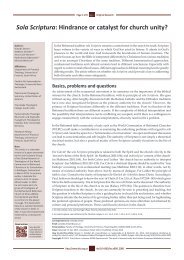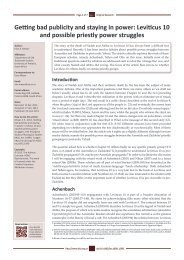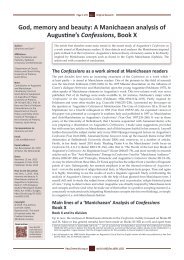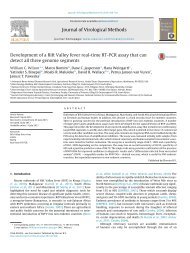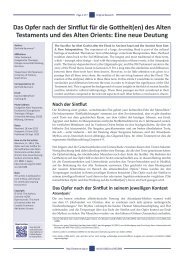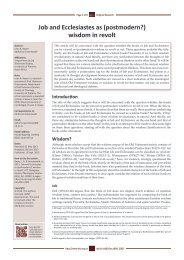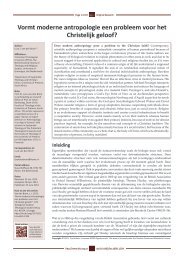Icon - Verbum et Ecclesia
Icon - Verbum et Ecclesia
Icon - Verbum et Ecclesia
Create successful ePaper yourself
Turn your PDF publications into a flip-book with our unique Google optimized e-Paper software.
Page 6 of 7<br />
Original Research<br />
If the text is read on a synchronic level, the addition of these<br />
verses to the Book of Isaiah leads to the thematic coexistence<br />
of two themes, namely on the one hand the ‘cleansing of<br />
Zion’ in chapter 1, and on the other hand the ‘pilgrimage<br />
of the nations’ (2:2–4). If this addition is to be dated in the<br />
5th century (or later), the question arises wh<strong>et</strong>her this thematic<br />
concatenation does not reflect a strong protest against the<br />
religious policies of Ezra and Nehemiah who forced all<br />
men in mixed marriages to divorce from their foreign wives<br />
(Ezr 9–10; Neh 13:23–31). Their policies furthermore closed<br />
the ranks of the post-exilic Judean congregation for Yahweh<br />
followers from other nations – yes even for their fellow<br />
Yahweh followers from Samaria (Berges 1998:71).<br />
The close literary connections b<strong>et</strong>ween 2:1 and 13:1 could be<br />
an indication that the oracle of the pilgrimage of the nations<br />
in 2:2–4 should be read against the downfall of Babylon<br />
(Berges 1998:75–76). Isaiah 13:1 forms the introduction to the<br />
Babylon oracle in Isaiah 13–14. If this text does not refer to<br />
the peaceful takeover of Babylon by Cyrus in 538, it could<br />
be a reference to Xerxes’ actions against Babylon in 482. 24<br />
This would make the incorporation of Isaiah 2:1–5 into the<br />
Book of Isaiah at a date after 482 a b<strong>et</strong>ter possibility. The<br />
nations will not go to Babylon any more, as it was destroyed<br />
by Xerxes. Jeremiah 51:44 testifies to this event and says: ‘I<br />
will punish Bel in Babylon, and make him disgorge what he<br />
has swallowed. The nations shall no longer stream to him;<br />
the wall of Babylon has fallen’ (NRSV). They will instead go<br />
to Zion, to the house of the God of Jacob, in order to learn<br />
the Torah of peace, which will replace their instruments of<br />
war. This fits very well as a reaction to the battle in which the<br />
Persian empire finally defeated the power of the Babylonian<br />
empire.<br />
Conclusion<br />
Zion’s final goal and purpose do not form part of the<br />
nationalistic dreams of either Israel or Judah (Watts 2005:49).<br />
The wish to be ‘nations like other nations’ (1 Sm 8:5) has<br />
been the cause of centuries of warfare and bloodshed as no<br />
righteousness and justice have come forth from this wish.<br />
Different parties in the Jerusalem in the final decades of the<br />
6th and 5th century claimed God’s promises for new forms<br />
of nationalistic struggles. The purpose of the Book of Isaiah<br />
– as is clearly formulated here at its ons<strong>et</strong> – is to deny these<br />
claims (cf. 65:1–16) and to present an entirely different vision<br />
of Zion’s destiny (Watts 2005:49). The city will be redeemed<br />
and will be equipped to become God’s instrument. In Zion<br />
he will receive all the nations and peoples and teach them<br />
his ways. Zion’s appeal will thus be religious and universal.<br />
What is the role of God’s people in this city? The rest of the<br />
Book of Isaiah addresses this question. God’s people will<br />
include only those who are dedicated to Yahweh, ‘servants<br />
24.In 482 a revolt broke out against the Persian rule, but Xerxes suppressed this<br />
rebellion with force. These events certainly were received with enormous joy in<br />
Judah: once again the arch-enemy Babylon, with its imperial gods, was punished<br />
by the Persians. This indeed was a sign that finally Yahweh’s history with his people<br />
would be heading for a new future. It certainly would have invoked new hope that,<br />
at last, Yahweh would restore Zion to its formal glory, as well as rebuild the cities of<br />
Judah (Groenewald 2003:236).<br />
of Yahweh’, from the remnants of Israel, Jerusalem and the<br />
nations. Justice, righteousness and obedience have been<br />
named as non-negotiable qualities which are needed for the<br />
city and its inhabitants. Faith and humility will be some of<br />
the virtues taught to the servants of Yahweh, the King of<br />
Zion and the God of Israel (Watts 2005:50).<br />
This oracle at the beginning of chapter 2 anticipates Yahweh’s<br />
initiative with his servant in Deutero-Isaiah and hereby adds<br />
a new chapter of Jacob’s history to the Book of Isaiah (Beuken<br />
2003:94). Although the patriarch Jacob was only the second<br />
son of an elected generation (Gn 25:19–26), he used a bit of<br />
cunning to g<strong>et</strong> hold of his brother’s birthright (Gn 25:29–34;<br />
27:1–40). In Isaiah 2:1–5 Jacob’s descendants also hold the<br />
second position after the nations in accepting Yahweh’s<br />
Torah, but subsequently they will become the elected servant<br />
and are employed to be ‘a light to the nations, that my<br />
salvation may reach to the end of the earth’ (Is 49:6; cf. also<br />
42:6).<br />
It is therefore not surprising at all that the later tradition<br />
portrayed Isaiah as a man who was great and trustworthy<br />
in his visions. Sirach depicts Isaiah as a man who by his<br />
dauntless spirit saw the future and comforted the mourners<br />
in Zion. He revealed what was to occur to the end of time and<br />
the hidden things before they happened (Sr 48:24–25).<br />
Acknowledgements<br />
Comp<strong>et</strong>ing interests<br />
The author declares that he has no financial or personal<br />
relationship(s) that may have inappropriately influenced<br />
him in writing this article.<br />
References<br />
Ackroyd, P.R., 1963, ‘A note on Isaiah 2:1’, ZAW 75, 320–321.<br />
Arn<strong>et</strong>h, M., 2000, Sonne der Gerechtigkeit. Studien zur Solarisierung der Jahwe-<br />
Religion im Lichte von Psalm 72, Harrassowitz, Wiesbaden. (BZAR 1).<br />
Berges, U., 1998, Das Buch Jesaja. Komposition und Endgestalt, Herder, Freiburg. (HBS<br />
16).<br />
Berges, U., 2001, ‘Personifications and proph<strong>et</strong>ic voices of Zion in Isaiah and beyond’,<br />
in J.C. de Moor (ed.), The elusive proph<strong>et</strong>. The proph<strong>et</strong> as a historical person,<br />
literary character and anonymous artist, pp. 54–82, Brill, Leiden. (OTS XLV).<br />
Beuken, W.A.M., 2003, Jesaja 1-12, Herder, Freiburg. (HThKAT).<br />
Blenkinsopp, J., 2000, Isaiah 1-39, Doubleday, New York. (AncB 19).<br />
Brueggemann, W., 1998, Isaiah 1-39, Westminster/John Knox, Louisville/London.<br />
(WBC).<br />
Clements, R.E., 1980, Isaiah 1-39, Eerdmans, Grand Rapids. (NCB).<br />
Clements, R.E., 1996, ‘A light to the nations: A central theme of the book of Isaiah’,<br />
in J.W. Watts & P.R. House (eds.), Forming proph<strong>et</strong>ic literature. Essays on Isaiah<br />
and the Twelve in honor of John D W Watts, pp. 57–69, Sheffield Academic Press,<br />
Sheffield. (JSOT.S 235).<br />
De Vries, S.J., 1995, From Old Revelation to New. A Tradition-Historical and Redaction-<br />
Critical Study of Temporal Transitions in Proph<strong>et</strong>ic Prediction, Eerdmans, Grand<br />
Rapids.<br />
Duhm, B., 1914, Das Buch Jesaja, 3rd edn., Vandenhoeck & Ruprecht, Göttingen. (HK).<br />
Fischer, I., 1995, Tora für Israel – Tora für die Völker. Das Konzept des Jesajabuches,<br />
Katholisches Bibelwerk, Stuttgart. (SBS 164).<br />
Fischer, I., 2008, ‘World peace and “holy war” – two sides of the same theological<br />
concept: “YHWH as sole divine power” (a canonical-intertextual reading of<br />
Isaiah 2:1-5, Joel 4:9-21, and Micah 4:1-5)’, in R. Cohen & R. Westbrook (eds.),<br />
Isaiah’s vision of peace in Biblical and modern international relations: Swords into<br />
plowshares, pp. 151–165, Palgrave MacMillan, New York.<br />
Fischer, I., 2010, ‘Israel und das Heil der Völker im Jesajabuch’, in H. Frankemölle & J.<br />
Wohlmuth (eds.), Das Heil der Anderen. Problemfeld »Judenmission«, pp. 184–<br />
208, Herder, Freiburg. (QD238).<br />
http://www.ve.org.za<br />
doi:10.4102/ve.v34i2.866


